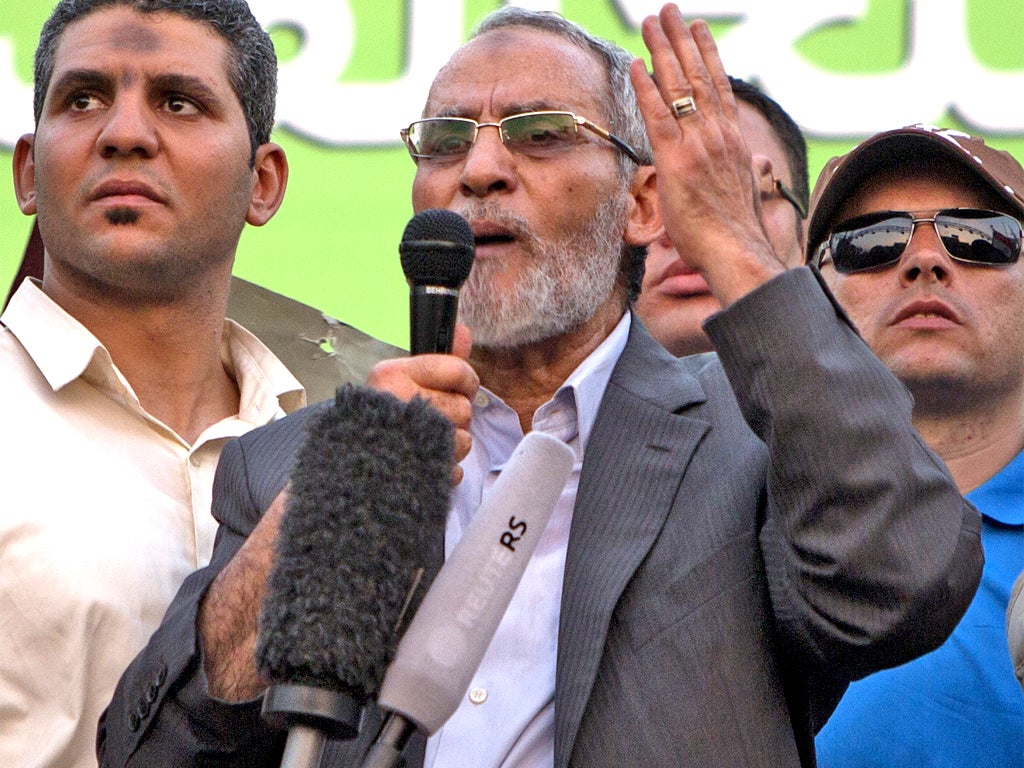Muslim Brotherhood leader Mohamed Badie wanted for inciting Cairo massacre
Prosecutor demands arrest of Supreme Guide for provoking army into shooting 55 civilians dead

Egypt’s authorities intensified their crackdown against the Muslim Brotherhood, issuing an arrest warrant for the group’s Supreme Guide Mohamed Badie over allegations that he incited Monday’s massacre in which more than 50 of his followers were shot dead.
In total, warrants were issued for nine other Muslim Brotherhood members. The news came as Brotherhood officials said they were preparing video evidence to refute the military’s claim that it had been provoked into shooting dead 55 civilians outside Cairo’s Presidential Guard headquarters.
Workers at the group’s media centre in Nasr City, the east Cairo suburb where Brotherhood supporters have been rallying since 30 June, showed The Independent what they said were unpublished videos featuring clips of troops repeatedly firing upon demonstrators.
In one example, a lone soldier can be seen taking pot shots at demonstrators as he stands on the roof of a building close to the Republican Guard headquarters, the scene of Monday’s killings. Another shows a rifleman repeatedly discharging his weapon at protesters from behind a barbed-wire barricade.
Mussab al-Shami, a volunteer at the media centre, accused the Egyptian media of accepting the army’s explanation of events and ignoring the scale of the killings. “It was a massacre,” he said. “The newspapers and television here do not want to tackle it at all. It’s because it goes against their editorial policy and because they are under pressure from the military junta.”
It was not possible to verify any of the footage, and the military has said the carnage began after its soldiers were attacked first. Video clips have also emerged which appear to show supporters of deposed president Mohamed Morsi wielding weapons once the clashes intensified.
But Amnesty International refuted the army’s account of the massacre, saying that its own evidence “paints a very different picture” to that projected by Egypt’s generals.
“Regardless of the fact that some protesters used violence and force, there are certain standards that the security forces need to comply with,” said Diana Eltahawy, Egypt researcher for Amnesty International.
The statement from the prosecutor general’s office said those wanted for arrest were suspected of fomenting the violence which erupted in the early hours of Monday morning. Authorities have already detained more than 600 Brotherhood members in the wake of the massacre. Many of those were released on bail, but prosecutors have announced that 206 Islamist activists must be locked up for a further 15 days.
Gehad el-Haddad, a spokesman for the Brotherhood’s political wing, said on Twitter that the arrests had been “politically motivated” and accused the authorities of using the “same old police-state tactics”.
Egypt’s revolutionary transition, which began with unbounded jubilation among its supporters, has been tarnished by Monday’s bloodshed.
Fears are growing that refuseniks within the Brotherhood will continue to undermine the process, while divisions are also beginning to emerge inside the anti-Morsi coalition.
The interim President, Adli Mansour, has issued a constitutional declaration laying out a seven-month timetable until parliamentary and presidential elections and proposing a shortened version of the constitution that defines how powers would be divided in the interim. Yet already disagreements have surfaced. The National Salvation Front, the leading coalition of liberal and secular parties, released a statement criticising the declaration on the grounds that it had not been consulted by the President, and calling for clauses to be added to, and removed from, the draft constitution.
Meanwhile campaigners from Tamarod, the revolutionary group which triggered the rebellion that toppled Mohamed Morsi, raised their own objections, including that it gives Mr Mansour the power to introduce new laws. “Adli Mansour took his decision without discussing it with anyone,” said Eman el-Mahdy, a co-founder of Tamarod. “We refuse this principle because it is the same principle which existed under the Muslim Brotherhood.”
Liberal and secular forces are keen not to repeat the mistakes of the past. Following the fall of Hosni Mubarak, many accused the military of sidelining them in a bid to cosy up to the Brotherhood.
Ostensibly at least, this is a civilian-led transition. But if political differences prove to be unbridgeable, only Egypt’s generals can fill the void.
Subscribe to Independent Premium to bookmark this article
Want to bookmark your favourite articles and stories to read or reference later? Start your Independent Premium subscription today.

Join our commenting forum
Join thought-provoking conversations, follow other Independent readers and see their replies